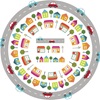Intimacy may be a worthy goal, but small groups are mostly about learning how to talk to one another. At least that's what Joe Myers, "multi-preneur" and author of The Search to Belong: Rethinking Intimacy, Community, and Small Groups (Zondervan), believes.
Myers shared his thoughts on small groups and community recently with Brett Eastman, CEO and Founder of Lifetogether:
We are moving into a cultural value shift that has heightened the value of belonging. In the research for my book, I found that people find significant belonging in a variety of places and ways. I categorize these as public, social, personal and intimate relational spaces that are actually built in people's minds.
People have a hierarchy of need for significant belonging. They need a large amount of significant public belonging in their life. They need just a little bit less of significant social belonging in life and just a little bit less personal significant belonging in life. People's need for being personal and intimate with each other has been far too over emphasized and pursued. In actuality, human beings are designed only to handle very few—maybe three—intimate relationships in their entire life.
I think people are experiencing a void in their lives, not on the level of intimacy, but on the level of significant social and personal belonging. Belonging and having a healthy sense of community in a person's life is greater than simply trying to get every relationship to be personal and intimate.
In over-emphasizing the large public belonging and the very small intimate belonging, we've created a gap of a major type of significant belonging. I call this space the "front porch space." Let me explain: Your neighbor comes over. If you don't have a front porch and he knocks on the door, you have two choices: you either have to invite him in or step outside. You don't want to invite him in; that's too close. So you have to step outside, and then he's wondering the whole time why you're standing outside and why you didn't invite him in. There's no space for us to just get together. We've taken those spaces away from our culture. Now they're starting to return, in the form of neighborhood Starbucks and the return of architectural front porches.
Small groups can actually build significance in people's lives if they concentrate on developing significant social space and good significant personal space. People create relational spaces in their minds all the time. People can share intimate information and not actually be in an intimate relationship. You can't be intimate with twelve people. Being at ease and at peace in connecting with other people's lives in a social and personal space will fill the real need.
What I like about the Lifetogether curriculum is that it promotes healthy "front porch" conversations. Most small groups bounce between social and personal belonging. Social belonging is defined where people connect by sharing snapshots of who they are. People have to have significant social and personal belongings in their life. Churches should develop those; small groups are a vehicle and Lifetogether is a tool for doing this.
Joe Myers owns a publishing services company for educational material as well as managing Front Porch Consulting. His consulting firm helps people in organizations, such as architectural firms, city planners, and congregations have conversations to help understand how people build and develop community and belonging in their life through building space that actually helps create the environment where community naturally emerges. Not just spiritual based, his firm includes elements of architecture, anthropology, sociology, and psychology.









